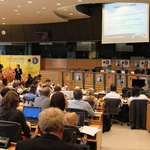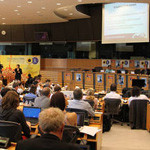As the EHR Incentive Programs move forward, subsequent stages of meaningful use aim to increase patient engagement and the flow of information between healthcare organizations, providers, and patients. According to one health IT developer, a novel approach to electronic prescribing (e-prescribing, eRx) could very well hold the key for eligible professionals and hospitals to satisfy requirements both for engaging patients and exchanging health information.
“E-prescribing is the act of routing prescriptions from the EMR in the doctor’s office directly to the pharmacy, but it cuts the patient out of the process,” says Zoe Barry, CEO and founder of ZappRx, an e-prescribing platform currently being tested in a pilot program in New York City. “I don’t see how that’s efficient and it seems to be contrary to the whole movement of patient engagement and coordination of care that we’re seeing in healthcare right now.”
The purpose of the NYC pilot program launched in late July 2013 is to demonstrate that patient participation in e-prescribing works. Two doctors affiliated with the Weill Cornell Medical Center, Garry Goldman MD, and Richard Cohen, MD, are currently working with Zitomer Pharmacy to use the web- and mobile-powered prescription management system for communicating securely with each other and patients and tracking medication pickups and adherence.
According to Barry, e-prescribing is “grossly inefficient” in two major areas. Neither does today’s infrastructure account for providers and pharmacists to communicate effectively, nor does it allow for patients to have visibility into a process that requires their participation in order to complete.
“E-prescribing as it stands today is the equivalent of a doctor writing an email to a pharmacist and the pharmacist not being able to respond, having to print the email, handwrite on it, and fax it back to the doctor,” she explains. “There’s no visibility into patients picking up their medications. It’s incredibly difficult to communicate with the pharmacist.”
In light of how both e-prescribing presently works and support is building for increased patient engagement and health information exchange (HIE) in Stage 2 Meaningful Use, Barry has recognized an opportunity for eligible providers to kill two birds with one stone by transforming the act of e-prescribing into a meaningful patient-centric activity by bringing patients into the e-prescribing workflow.
“Now that there’s a shift away from pay-for-service and to pay-for-performance and accountable care, people are really going to need — whether it’s meaningful use or not — to get that patient engaged,” she observes. “General consumers are not going to log on through their computers into their EMR plans once a year, but if you get them with their medication that they touch every single month and possibly every single day with their adherence, then you can really get some great data.”
Considering that the eRx Incentive Program has in many ways served as precursor for the EHR Incentive Programs and other health IT adoption initiatives, it would be fitting for e-prescribing innovation to become the mechanism for paving a way toward meaningful use compliance in the years to come, not to mention the impact this technology could have on making patients an active part of their own healthcare. Source






























